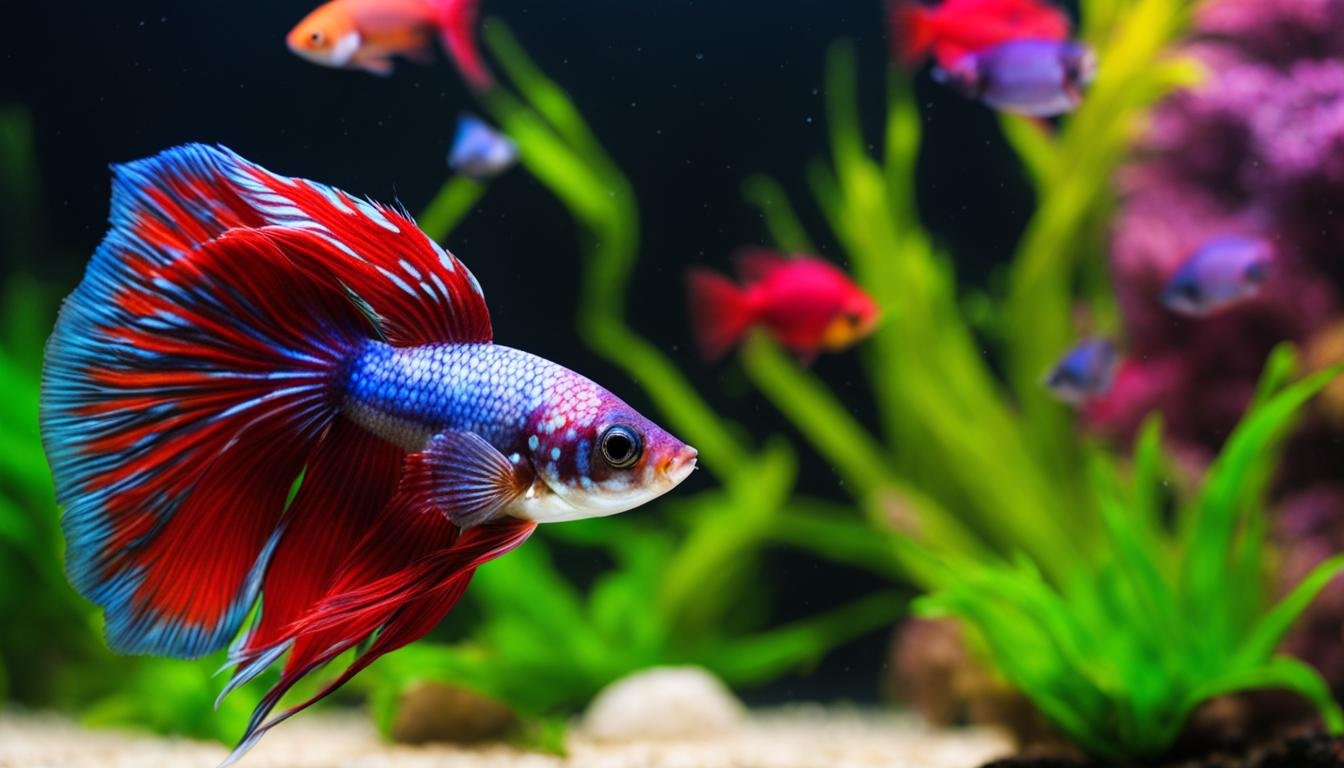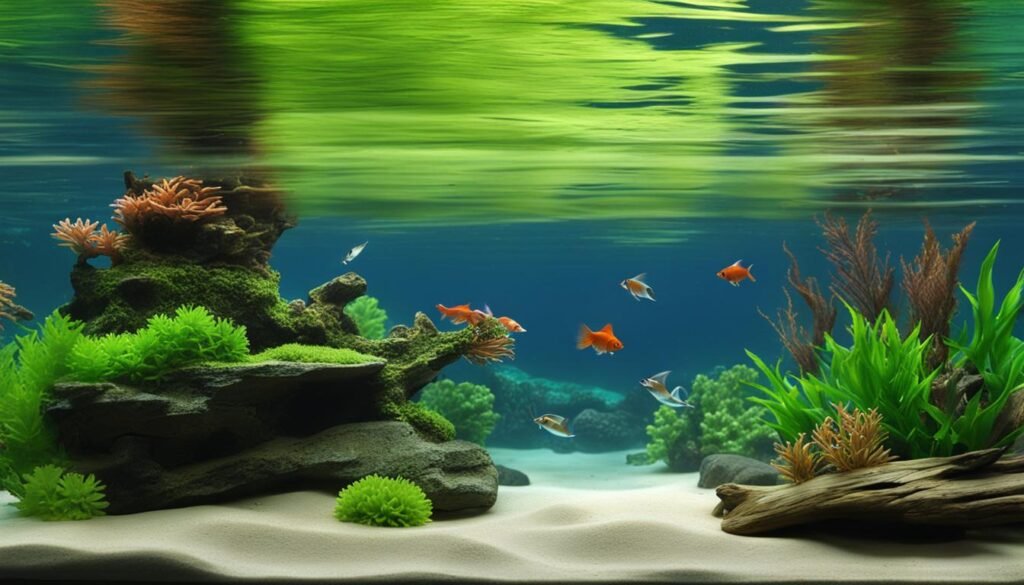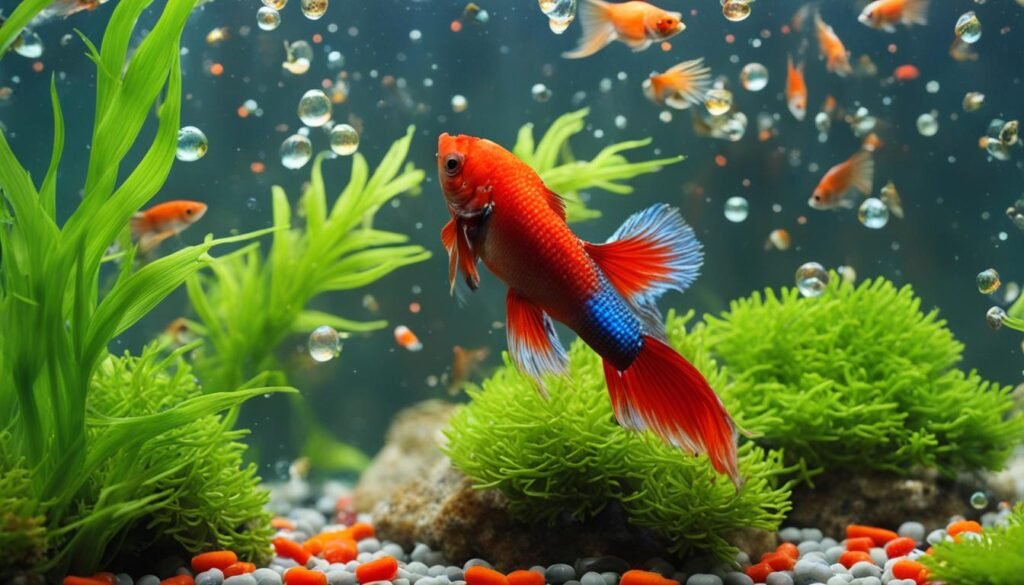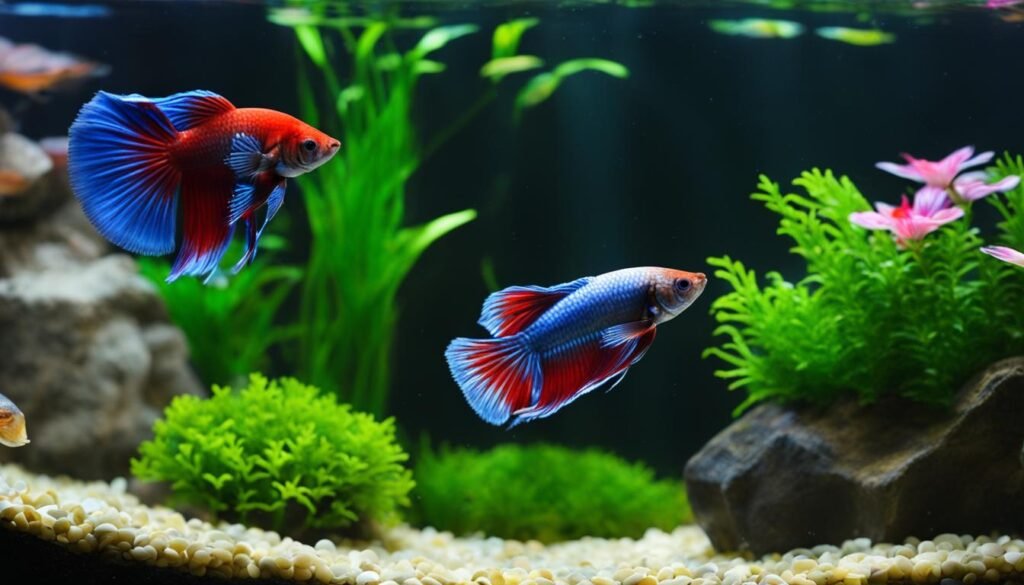Your cart is currently empty!

Can Betta Fish Live With Guppies? Your Aquarium Guide.
Welcome to our comprehensive guide on whether betta fish can live with guppies in the same tank. If you’re considering adding these vibrant and fascinating fish to your aquarium, it’s important to understand their compatibility and the factors to consider for a successful cohabitation. Let’s dive in and explore the world of betta fish and guppies!
Key Takeaways:
- Bettas and guppies can be kept together in a shared tank under certain conditions
- Understanding the temperaments and behaviors of both species is crucial
- Providing an ideal tank size, suitable hiding spots, and proper water parameters is essential
- Genders play a role in compatibility, with male bettas being more aggressive
- Feeding and dietary needs should be taken into consideration for both species
Understanding Guppies And Betta Fish
When it comes to creating a harmonious community tank, it’s essential to have a solid understanding of the characteristics and behaviors of the fish species you want to keep together. In this section, we will provide an overview of both betta fish and guppies, shedding light on their unique qualities and how they interact with one another.
Betta Fish Overview
Betta fish, also known as Siamese fighting fish, are native to the warm waters of Southeast Asia. These mesmerizing creatures are famous for their vibrant colors and flowing fins, making them a popular choice among aquarium enthusiasts. However, bettas are also known for their territorial nature, particularly the males. Male bettas tend to be aggressive towards other male bettas and similar-looking species, as they engage in fierce battles for dominance.
Guppy Overview
Guppies, on the other hand, are renowned for their striking colors and iridescent shine. Often referred to as millionfish or rainbow fish, guppies are a favorite among fishkeepers due to their captivating appearance and lively personalities. Unlike bettas, guppies are generally peaceful and social, making them excellent tank mates for a variety of species. Their docile nature and adaptability make them an attractive choice, especially for beginners.
The Fascinating World of Guppies and Bettas
The world of guppies and bettas is full of wonder and intrigue. Understanding the unique qualities of each species is crucial in determining their compatibility and creating a thriving community tank. In the following sections, we will explore the necessary tank requirements, gender considerations, feeding and dietary needs, as well as strategies for monitoring and managing aggression between these two captivating fish.
Tank Requirements

In order to create a suitable environment for both bettas and guppies, there are certain tank requirements that need to be considered. These include ideal tank size, decorations and hiding spots, as well as maintaining proper water parameters and filtration.
Ideal Tank Size
An ideal tank size for keeping bettas and guppies together is at least 10 gallons. This size provides enough space for each fish to establish their territory, reducing the chances of aggression. It also allows for better water quality and easier maintenance.
Decorations and Hiding Spots
Decorations such as plants, rocks, and caves are essential for creating hiding spots and territories for both species. Bettas and guppies appreciate having places to retreat to, especially when they feel threatened or stressed. These decorations not only provide safety but also add visual appeal to the tank.
Water Parameters and Filtration
Maintaining proper water parameters, including temperature and pH level, is crucial for the well-being of both bettas and guppies. It is recommended to keep the water temperature between 76 and 82 degrees Fahrenheit and maintain a pH level of around 7.0. Additionally, a reliable filtration system should be in place to keep the water clean and free from toxins.
Gender Considerations
When it comes to keeping betta fish and guppies together, considering the gender of these species is crucial for a harmonious tank. Male bettas are known to be more aggressive and territorial, especially towards other males or similarly colored species. Therefore, it is not recommended to keep male bettas with colorful male guppies, as this can lead to aggression and potential harm to the fish.
On the other hand, female bettas tend to be more relaxed and less aggressive, making them a better choice for cohabitation with guppies. It is possible to keep a female guppy with a single male betta, as long as precautions are taken to maintain an appropriate ratio of females to males. This helps to reduce the chances of territorial disputes and aggression in the tank.
Genders and Tank Dynamics
Having a clear understanding of the dynamics between male bettas and guppies is essential for successful cohabitation. Male bettas are naturally inclined to establish dominance and may become aggressive towards any perceived threats to their territory. Male guppies, with their vibrant colors, can trigger this aggression. It is best to avoid combining these two male fish in the same tank.
Female bettas, on the other hand, are less likely to display aggressive behavior. They can coexist peacefully with guppies, including male guppies. However, it is important to maintain a proper balance by having multiple female guppies to reduce the male’s attention towards a single female. This helps prevent excessive chasing or harassment.
Tank Mates and Compatibility
When considering the compatibility of male bettas and guppies, it is important to note that bettas have a natural instinct to flare their fins and display territorial behavior. This can intimidate guppies and may lead to stress or injury. As a result, it is generally recommended to avoid keeping male bettas and guppies together, even if they appear to be compatible initially.
Female bettas, as mentioned earlier, are generally more tolerant and can coexist peacefully with guppies. However, it’s always a good idea to closely monitor their interactions and be prepared to separate them if any signs of aggression or stress arise.
In summary, when it comes to keeping betta fish and guppies together, considering the gender and temperament of these species is crucial. While male bettas are generally more aggressive and should be kept separate from guppies, female bettas can coexist with guppies under careful monitoring. By taking gender considerations into account, you can ensure a peaceful and harmonious tank for both species.
Feeding And Dietary Needs Of Both Species

When it comes to feeding betta fish and guppies, it’s important to understand their unique dietary needs and provide them with a balanced and varied diet. Here, we’ll explore the types of food that are suitable for both species and discuss the feeding schedule and frequency that will keep them healthy and thriving.
The Types of Food for Bettas and Guppies
Betta fish are carnivores and require a diet rich in protein. They thrive on a combination of high-quality betta pellets, flakes, and freeze-dried or frozen foods such as bloodworms and brine shrimp. Providing a diverse range of food options will help ensure that their nutritional needs are met. It’s important to note that overfeeding bettas can lead to obesity and other health problems, so portion control is crucial.
Guppies, on the other hand, are omnivores and need a balanced diet that includes both plant-based and protein-rich foods. They can be fed a combination of guppy flakes, pellets, and freeze-dried or frozen foods. Additionally, offering them small amounts of vegetables such as spinach or peas can provide valuable nutrients and fiber.
Feeding Schedule and Frequency
Establishing a consistent feeding schedule is important for both bettas and guppies. For bettas, it is recommended to feed them once or twice a day, with each feeding consisting of only a few pellets or flakes. It’s best to avoid overfeeding as this can lead to bloating and other digestive issues.
Guppies should be fed small amounts multiple times a day to mimic their natural feeding behavior. Offering them food two to three times a day in small portions will help prevent overeating and ensure that they receive a balanced diet. It’s important to observe the fish during feeding to ensure that all the food is consumed within a few minutes. Any uneaten food should be promptly removed to maintain good water quality.
By providing a varied diet and following a consistent feeding schedule, you can ensure that both your betta fish and guppies receive the nutrition they need to thrive in your aquarium.
Monitoring And Managing Aggression

When keeping betta fish and guppies together, it’s crucial to monitor their interactions closely to ensure their well-being. Signs of aggression between the two species can include chasing, fin nipping, and aggressive behaviors. If you notice these behaviors, it’s important to take immediate steps to prevent and address aggression in your tank.
Preventing Aggression
- Provide Sufficient Hiding Spots: Creating plenty of hiding spots with plants, rocks, and caves can help reduce aggression by giving both bettas and guppies a place to retreat and establish their territories.
- Separate Males: Male bettas are typically more aggressive, especially towards other males or fish with similar colors. It’s best to avoid keeping male bettas with colorful male guppies to prevent fights and territorial disputes.
- Maintain Appropriate Ratios: If you choose to keep a female guppy with a male betta, ensure there are enough female guppies to prevent excess attention from the male betta. This can help reduce aggression and prevent overbreeding.
Addressing Aggression
- Observe the Aggressive Individual: If one particular fish is displaying aggressive behavior, consider removing it from the tank and providing an alternative tank or a separate enclosure.
- Reevaluate Tank Setup: If aggression persists despite efforts to prevent it, reassess the tank setup. Ensure there are enough hiding spots and territories available for both bettas and guppies.
- Consider Alternative Tank Mates: If aggression continues to be a problem, you may need to consider removing either the betta or the guppies from the tank and introducing alternative tank mates that are more compatible with the remaining fish.
Breeding And Cohabitation
Breeding bettas and guppies together in the same tank can lead to increased aggression, overcrowding, and potential health issues. It is essential to carefully consider the risks and be prepared to separate them if necessary. If you do choose to breed these two species, it’s best to provide separate breeding tanks or remove the fry (baby fish) once they are born to prevent aggression and overcrowding in the main tank.
Conclusion
After considering the temperaments, tank setup, and monitoring requirements, we can conclude that betta fish and guppies can be suitable tank mates. However, it is crucial to prioritize their well-being and follow specific guidelines to ensure a harmonious cohabitation.
Creating an ideal tank environment is essential for the successful coexistence of bettas and guppies. Providing a tank size of at least 10 gallons, suitable hiding spots, and maintaining proper water parameters are integral to their overall health and happiness.
Gender considerations are also important. Male bettas are generally more aggressive and territorial, while female bettas tend to be more relaxed. When keeping male bettas with guppies, caution should be exercised to prevent aggression. Female bettas, on the other hand, are usually a better choice when considering their compatibility with guppies.
It is crucial to monitor their interactions closely and be prepared to make adjustments if aggression becomes a concern. Breeding bettas and guppies together should be done with caution, considering the risks of aggression, overcrowding, and potential health issues.
By following these guidelines, you can create a peaceful and harmonious community tank with bettas and guppies. With careful consideration, suitable tank mates for betta fish can be found, allowing for an enjoyable and visually stunning aquarium experience.
FAQ
Can betta fish live with guppies?
Yes, betta fish can live with guppies under certain conditions. It is important to consider their individual temperaments, tank setup, and proper monitoring to ensure their well-being.
What do I need to know about betta fish and guppies?
Bettas, also known as Siamese fighting fish, are territorial, while guppies are known for their colorful appearance. Understanding their characteristics and behaviors is crucial in determining their compatibility.
What are the tank requirements for betta fish and guppies?
It is important to provide an ideal tank size of at least 10 gallons, choose suitable decorations and hiding spots, and maintain proper water parameters and filtration to meet the needs of both species.
Should I consider the gender of betta fish and guppies?
Yes, male bettas are generally more aggressive and may not be suitable to be kept with colorful male guppies. Female guppies and female bettas are usually more relaxed and can be compatible tank mates.
What should I feed betta fish and guppies?
Bettas are carnivores and thrive on insect-rich diets, while guppies are omnivores and require more plant-based diets. It is important to provide a diverse nutritional regimen that includes flakes, pellets, freeze-dried foods, and live or frozen foods.
How can I monitor and manage aggression between betta fish and guppies?
Signs of aggression can include chasing, fin nipping, and aggressive behaviors. Close monitoring, providing alternative tank mates if necessary, and maintaining appropriate tank setup can help prevent and address aggression.
Can I breed betta fish and guppies together?
Breeding bettas and guppies in the same tank can lead to aggression, overcrowding, and health issues. It is important to consider the risks and be prepared to separate them if necessary.
What are the key takeaways about betta fish and guppies cohabitation?
While it is possible for betta fish and guppies to live together in the same tank, it requires careful consideration of their temperaments, tank setup, and proper monitoring. By following the provided guidelines, it is possible to create a peaceful and harmonious community tank with bettas and guppies.
Leave a Reply